Through the FIRNS initiative, TENT is working on a new blueprint for investment into nature recovery.

In partnership with Marketing & PR Agency IndigoEight, TENT organised two 1-night media trips to Cornwall in September 2021, to support the work of the Beaver Trust. TENT, as passionate advocates of thriving ecosystems, are supporting the Beaver Trust in their mission to ‘breathe life’ back into our rivers by reintroducing the ecosystem engineer and ‘climate ally’ species, the beaver.
Alongside James Wallace, Chief Executive of the Beaver Trust, the group spent time with Chris Jones from the Cornwall Beaver Project based at Woodland Valley Farm, and then with Merlin and Lizzie Hanbury-Tenison at Cabilla Cornwall.
Both sites have enclosures, each home to a family of beavers (including the first kits to be born on Bodmin Moor in 400 years). Across the two dates, 16 journalists and influencers from national and regional newspapers, leading travel and wildlife magazines as well as significant environmental platforms, experienced a 24-hour immersion in this keystone species, learning their value as ecosystem engineers and their vital input to the recovery of British landscape and national water management. Importantly, they also had the opportunity to see them in their natural habitat – bathing with their young beside the lodges and dams they’d built.
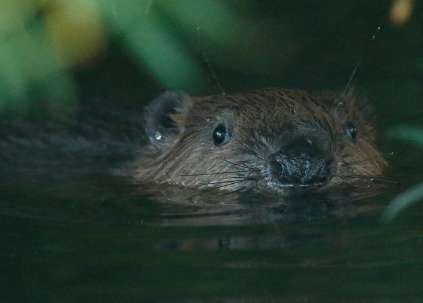
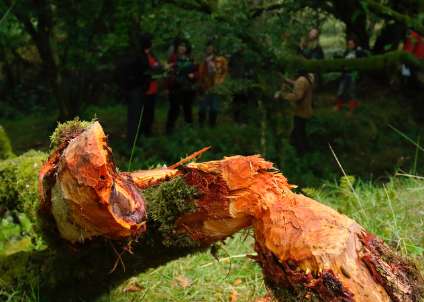
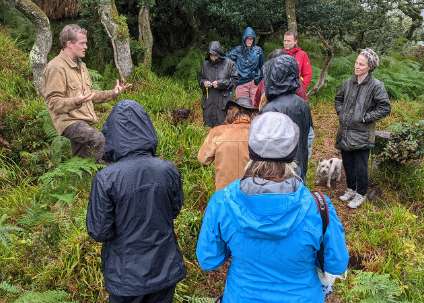
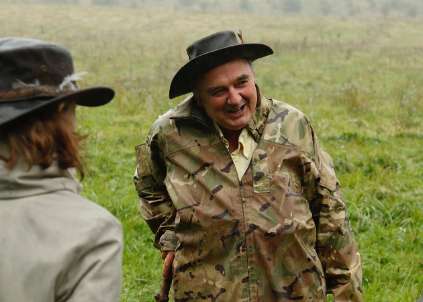
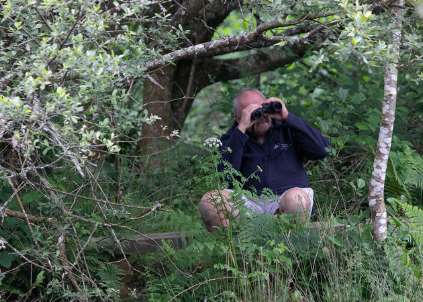
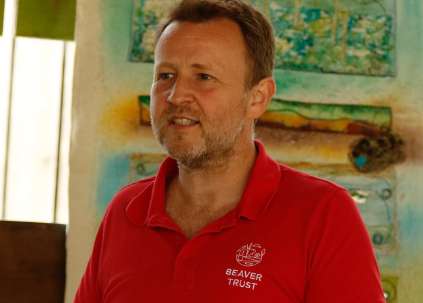
Beavers once ranged throughout the entirety of Britain’s waterways, but were most likely hunted to extinction by the late 1700s. Our lust for their glands, furs and meat drove the UK population’s destruction. The health of our rivers has suffered with their loss: According to the Water Framework Directive, just 14 per cent of UK rivers are today in ‘Good’ ecological health.
The national movement to reintroduce beavers to Britain is quickly gathering pace. In Scotland, following a trial phase and monitoring of a free-living population that had escaped onto the River Tay from a private collection, beavers were listed by Scottish Natural Heritage as a Protected Species in May 2019. In England, there are a number of enclosed beaver trials, and now free-living populations established on the rivers Otter, Tamar, Wye, Avon and Stour. Following the success of the River Otter Beaver Trial – which published results last year – the UK Government announced that the River Otter beavers could remain wild, and now a consultation process is underway with stakeholders on a national approach to further wild releases, and the future management strategy of the species. Scotland has a population of around 1,000; England around 500. They will be given protected status in 2022, making it illegal to kill them or interfere with their habitats. The Beaver Trust is now working with a range of conservation groups to breathe life back into our rivers. They are working with farmers and landowners to establish the conditions for beaver comeback; collaborating with the Rivers Trust, The Woodland Trust, and the National Trust to create more suitable beaver habitats along our riverways; and communicate the ecological and societal benefits of beavers to all stakeholder groups.
The beaver is an ecosystem engineer species. By creating dams, they influence the hydrology of rivers, stabilise water levels, and increase the area of standing water habitats. They create open water features in wetlands and peatlands, providing sorely-needed habitat for invertebrates, fish and amphibians, increasing the prey availability for wetland-loving bird species. As beaver populations expand, they create a system of channels, irrigating new stands of willow, alder and other diverse tree species. By clearing the canopy of riparian woodland, they increase the amount of sunlight penetrating to the riverbank and riverbed, increasing the resources available for aquatic vegetation, tree saplings, reedbeds and native grasses.
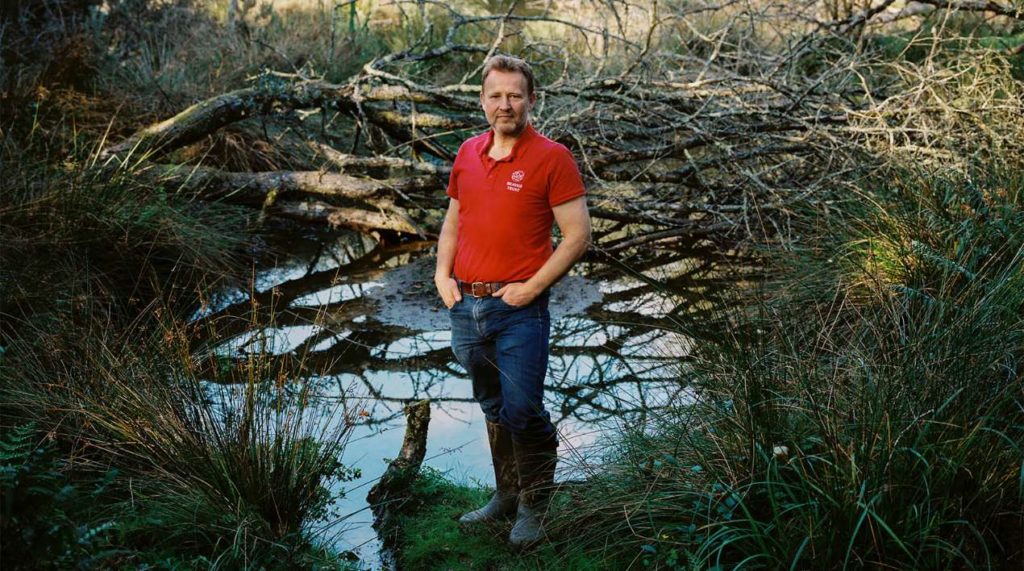
Over the years, waterways, rivers, wetlands and floodplains have been manipulated. An estimated 300,000 hectares of lowland wet grassland were converted to arable lands between 1970 and 1985, and 1.5 million hectares of upland blanket peatland was drained in the mid-century. Rivers have been re-engineered: a barrier now punctuates every 1.5 kilometre stretch of river. As waterways have been manipulated, we have lost many natural flood defences. Now, 5.2 million homes are at risk of flooding every year.
Beavers are a natural solution: by building dams and influencing the riverbed, they can attenuate average flood flows by up to 60 per cent. Their dams help to remove nitrogen, phosphate and other agricultural pollutants. A 2016 study on the River Tamar showed that beavers on two wooded sites had a significant effect in reducing the peak flow rate, reduced total discharges of water, and increased the amount of time from peak rainfall to peak discharge by 21 per cent. Beaver wetlands act as buffer zones by filtering compounds and human-caused pollutants (heavy metals, disease-causing agents, nitrogen), thus increasing water quality and lessening the costs of downstream wastewater treatment.
TENT are committed to raising the profile of these wonderful creatures. Last year, TENT funded the production of the educational film Beavers Without Borders, which you can watch below.
We would like to thank all of the journalists and ambassadors that came on the trip
The Guardian
Read Jane Dunford’s piece here
Independent
Read Teresa Levonian Cole’s
piece here
Daily Express
Cornish Guardian
CornwallLive
Read Olivier Vergnault’s
piece here
Wanderlust here
Geographical magazine
Listen to Jacob Dykes’s piece here
Country & Town House
Read Lucy Cleland’s piece here
BILLIONAIRE magazine
Reaction magazine
Read Caitlin Allen’s piece here
The Environment magazine
Wander Woman podcast
Calendar magazine
EcoHustler.com
Read Matt Mellen’s piece here
Matador Network
@benswildlife
@lucy_lapwing
@catherinecapon
Please join us in our mission, spread this article, and share the word about the rightful return of the beaver!
Through the FIRNS initiative, TENT is working on a new blueprint for investment into nature recovery.
An amazing attendance at the RGS to celebrate Belizean conservation!
8 international journalists tell the story of Belizean conservation

